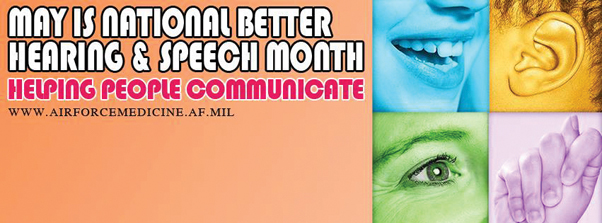May is Better Hearing and Speech Month, where we seek to raise awareness about communication disorders and learning how to recognize their signs. Below are things you should know, from the American Speech and Language Hearing Association.
Know the signs of hearing loss in children:
•Lack of attention to sounds (birth-1 year)
•Does not respond when you call his/her name (7 months-1 year)
•Does not follow simple directions (1-2 years)
•Shows delays in speech and language development (birth-3 years)
•Pulls or scratches at his/her ears
•Difficulty achieving academically, especially in reading and math
•Socially isolated and unhappy in school
•Persistent ear discomfort after exposure to loud noise (regular and constant listening to electronics at high volumes)
What can you do as a parent?
•See an audiologist if your child did not pass the newborn hearing screening
•See an audiologist if you have any concerns about your child’s hearing (some hearing losses can begin months or years after birth)
•Ask your audiologist about the need for hearing aids or cochlear implants
Adult signs of hearing loss are:
•Inattentiveness
•Buzzing or ringing in their ears
•Failure to respond to spoken words
•Persistent ear discomfort after exposure to loud noise (regular and constant listening to electronics at high volumes)
•Muffled hearing
•Constant frustration hearing speech and other sounds
•Avoids conversation
•Social isolation
•Depression
Know the signs of language disorders in children:
•Does not smile or interact with others (birth and older)
•Does not babble (4-7 months)
•Makes only a few sounds or gestures, like pointing (7-12 months)
•Does not understand what others say (7 months-2 years)
•Says only a few words (12-18 months)
•Words are not easily understood (18 months-2 years)
•Does not put words together to make sentences (1.5-3 years)
•Has trouble playing and talking with other children (2-3 years)
•Has trouble with early reading and writing skills (2.5-3 years)
What can you do as a parent?
•Listen and respond to your child
•Talk, read, and play with your child
•Talk with your child in the language you are most comfortable using
•Know it is good to teach your child to speak a second language
•Talk about what you are doing and what your child is doing
•Use a lot of different words with your child
•Use longer sentences as your child gets older
•Have your child play with other children
Know the signs of speech sound disorders in children:
•Says p, b, m, h, and w incorrectly in words (1-2 years)
•Says k, g, f, t, d, and n incorrectly in words (2-3 years)
•Produces speech that is unclear, even to familiar people (2-3 years)
What can you do as a parent?
•Say the sounds correctly when you talk—it is okay if your child makes some mistakes with sounds
•Do not correct speech sounds—it is more important to let your child keep talking
Know the signs of stuttering (disfluency) in children:
•Struggles to say sounds or words (2.5-3 years)
•Repeats first sounds of words—”b-b-b-ball” for “ball” (2.5-3 years)
•Pauses a lot while talking (2.5-3 years)
•Stretches sounds out—”f-f-f-f-farm” for “farm” (2.5-3 years)
What can you do as a parent?
•Give your child time to talk
•Do not interrupt or stop your child while he or she is speaking
•See an SLP if you are concerned (Many young children stutter for a short period of time. In most cases, the stuttering will stop.)
Know the signs of a voice disorder in children:
•Uses a hoarse or breathy voice
•Uses a nasal-sounding voice
What can you do as a parent?
•See a doctor if your child sounds hoarse or breathy or has a nasal-sounding voice
•Tell your child not to shout or scream
•Keep your child away from cigarette smoke
Adult signs of speech and language disorders are:
•Struggles to say sounds or words (stuttering)
•Repetition of words or parts of words (stuttering)



